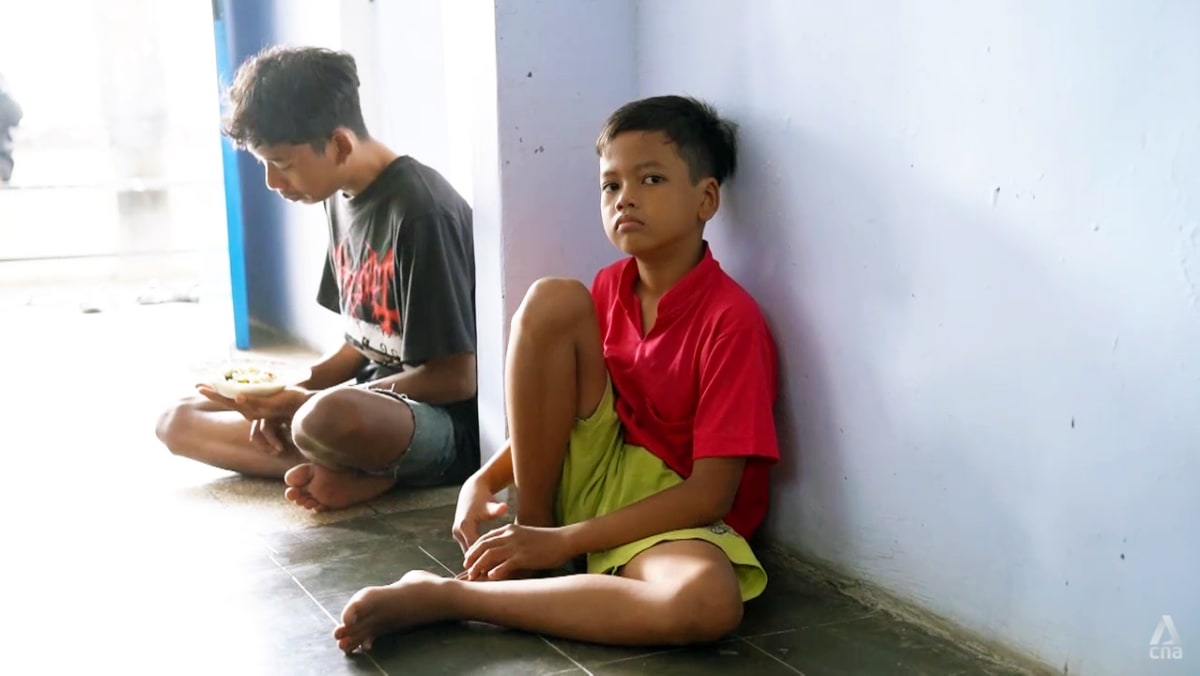EAST JAVA: In August, 17-year-old Tasya Aprilia Agatha lost her father to COVID-19. It left the family struggling to survive.
As a delivery driver and sole breadwinner, he used to earn just enough for the family every month. With his death, an alternative source of income was needed, and Tasya had to step up.
Six days a week, she wakes at 4am to help her mother run a makeshift food stall, while juggling school and working in a cafe. She gets about four hours’ sleep a day.
“I’m working because I want to help my mother and to pay my school fees,” she said. “I can use my income … to pay my own expenses. I don’t have to ask my mother (for money).”
The high school senior in Kediri city in East Java dreams of going to university and becoming a businesswoman. But with her punishing schedule, her school grades have slipped.
According to the World Bank report, only 30 per cent of Indonesian children achieved minimum scores in reading on the Programme for International Student Assessment before the pandemic.
The report estimates that school closures precipitated by the pandemic could result in a loss of between 25 and 35 points, on average, on students’ reading scores.
A Unicef report also noted that an increased drop-out rate from school closures puts children at risk of child marriage and exploitative activities.
Minister of Women’s Empowerment and Child Protection Bintang Puspayoga acknowledged that child marriage and child labour are “on the rise” owing to the unavoidable “economic pressure” from the pandemic.
“We need to build a support system together in the form of a safe and comfortable environment for them,” she said.
Related stories:
'A lost generation': COVID-19 takes emotional toll on Indonesia’s young
‘My son dreamt of becoming a soldier’: COVID-19 takes a toll on Indonesian children
But once the children drop out, they are left with no option but to join the workforce. After earning money, some do not turn back.
Take, for example, 10-year-old Rizki: He has been working as a street clown in Depok city in West Java for a year.
The money he earns — around two million rupiah (S$190) a month — helps to pay the rent on the house he shares with his 24-year-old brother Iksan and his brother’s wife, Endah.
Endah has tried to persuade Rizki to get an education so he can apply for better jobs in future. But when asked if he wanted to return to school, he said: “No, I don’t. We need money to pay the house rent.”
According to Kediri mayor Abdullah Abu Bakar, around 300 children in the city have lost their parents during the pandemic.
To help them and their carers, the local government is working on a programme called “Hope for Family”, to be launched this year with the help of the private sector.
The programme includes an initiative to create a bank account for each beneficiary, which the local government will transfer funds to “either monthly or annually”, the mayor cited.
Save the Children Indonesia is working on a similar project. In the province of West Java, the non-governmental organisation works with the local office of the Social Affairs Ministry to help children who have lost their main carers.
WATCH: Asia’s lost generation: Indonesia’s children orphaned by COVID-19 (46:38)
Read this story in Bahasa Indonesia here.
WITH HOPE, BRACED FOR THE NEXT WAVE
Today, with close to half the population fully vaccinated, COVID-19 cases have dropped significantly since July, when Indonesia battled a second wave of infections driven by the Delta variant.
The country’s daily count dropped to below 100 new cases at one point in December, but it has since started to increase again, with the prevalence of the Omicron variant.
Related story:
Last month, Indonesia also started vaccinating children aged six to 11, to further contain the spread of the virus.
Their education is of equal concern, however, with Yarrow noting that there are “lots of different actors and different levels of government trying to provide support”.
“Recovering from the learning loss during COVID and improving beyond it are major challenges,” he said.
This is something Indonesian authorities must grapple with even as they prepare for a new wave of infections. “We pray that it won’t happen and that things will return to normal,” said Abdullah.
“The number of school drop-outs has actually decreased. But because of COVID-19, it’s increasing again. We have to keep the number in check because the best investment is education for our children.”




